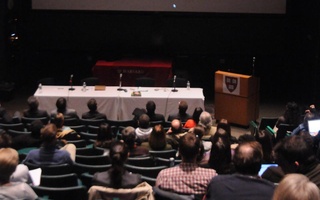With the aim of addressing the intersection of religious and queer identities, Harvard Jewish Law Students Association and BAGELS, the undergraduate Jewish LGBT group, teamed up to host a talk last night given by Doctor Norman P. Spack, who works with transgender children.
A pediatric endocrinologist at Children’s Hospital Boston, Spack described his work as co-director of the Gender Management Service Clinic, which administers puberty blockers to gender-questioning pre-adolescents in order to delay the onset of puberty. This process provides those children who affirm a gender different from their biological sex the time to be certain of their desire to continue pubertal development with the sexual characteristics of the gender with which they identify. Once they reach a certain age—after the medication has prevented the onset of bodily developments for several years—they can be administered hormones specific to their identified gender.
Throughout his talk, Spack invoked religious notions of helping others as central to motivating his work, citing the 12th century Jewish physician and philosopher Maimonides as saying, “If one is able to rescue and does not, he transgresses the injunction from Leviticus: though shalt not stand idly by the blood of thy neighbor.”
Attendee Joanna Ware, Lead Organizer and Training Coordinator of Keshet—a Boston-based Jewish LGBT group whose name is Hebrew for “rainbow”—also emphasized this sentiment of taking a stand, noting the importance of building community for people navigating the interplay of religion and gender in their identity.
“There are GLBT Jews for whom both of those identities are central to who they are in the world, and for whom their Jewish identity is informed by the experiences they’ve had as GLBT people, for better or for worse,” said Ware. She continued by connecting core principles of Judaism—the notion that everyone is formed in the image of God, and that it is important to welcome strangers and treat others with respect—to the role of creating an environment where transgender people can feel welcome.
BAGELS co-president Emily S. Unger ’13 also noted the importance of recognizing the roles of both gender and religion in people’s identities.
“So often you see queer issues and religious issues as only being in conflict with each other,” said Unger. “This event is a great example of how deeply held religious beliefs can actually lead you to help transgender people, and that’s an important realization for Jewish and LGBT communities alike.”
—Staff writer Alice E.M. Underwood can be reached at aeunderw@fas.harvard.edu.
Read more in News
Police Arrest Robbery SuspectRecommended Articles
-
Doctor Promotes Medical View of TransgenderismNorman P. Spack, a pediatric endocrinologist who works with transgendered youth, promoted the treatment of transgenderism as a medical condition, ...
-
 Officials and Professors Discuss Preservation of Amazon
Officials and Professors Discuss Preservation of Amazon -
Swastika Graffiti Prompts Condemnation from Faith LeadersTwo swastikas were found on the side of a Harvard-owned building located at 69 Dunster Street on Sunday, prompting religious leaders to condemn the act of vandalism and the hateful message commonly associated with the image.
-
 Housing Day, Their Own Way
Housing Day, Their Own Way -
Experimenting with Progressive AlternativesA class devoted to reinventing society, “Progressive Alternatives: Institutional Reconstruction Today” not only crosses intellectual boundaries, but also uses modern technology to allow college students from around the world to interact in real time.
-
A Distortion of Our MessageContrary to the allegations of sexism, at the heart and opening statement of TLR’s platform is “the inherent dignity of every human.”













